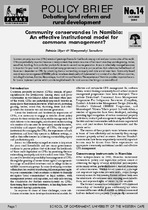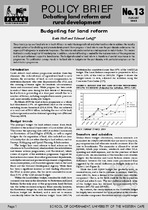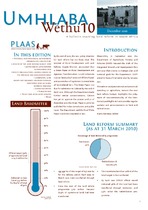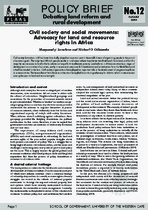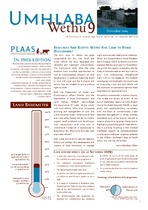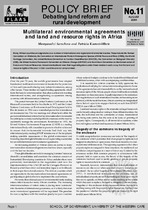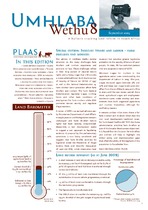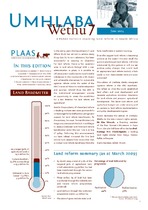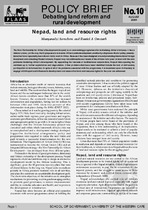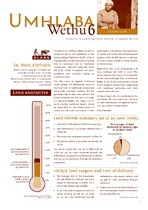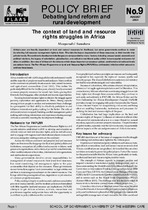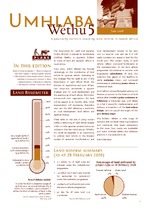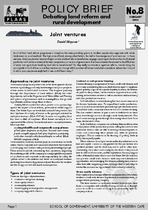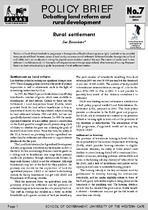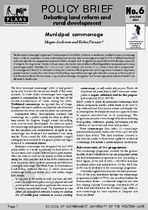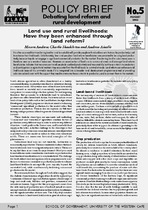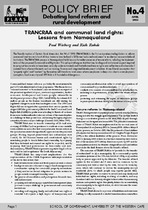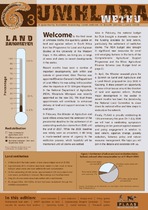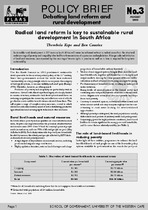Faculty of Economic and Management Sciences: Recent submissions
Now showing items 821-840 of 1101
-
Community conservancies in Namibia: An effective institutional model for commons management?
(Institute for Poverty, Land and Agrarian Studies, University of the Western Cape, 2004)Common property resources (CPRs) remain of great significance for livelihoods among rural and poor communities of the world. CPRs are particularly important because in many contexts they remain resources of last resort ... -
Budgeting for land reform
(Institute for Poverty, Land and Agrarian Studies, University of the Western Cape, 2004)The primary purpose of land reform in South Africa is to redistribute agricultural and other land in order to address the racially skewed pattern of landholding and promote development. Slow progress in land reform over ... -
National and provincial government spending on agriculture
(PLAAS, 2010-12)By the end of 2010, the new policy direction for land reform has not been clear. The minister of Rural Development and Land Reform, Gugile Nkwinti, announced that a Green Paper on Rural Development and Agrarian Transformation, ... -
Civil society and social movements: Advocacy for land and resource rights in Africa
(Institute for Poverty, Land and Agrarian Studies, University of the Western Cape, 2004)Civil society formations in Africa have historically played an important part in the establishment of organising people in the pursuit of common goals. The majority of Africa’s people reside in rural areas where they ... -
Resources and rights: Water and land in rural development
(PLAAS, 2009-11)Both the Department of Water and Environmental Affairs (DWEA) and the Department of Rural Development and Land Reform (DRDLR) acknowledge the importance of water reform jointly with land reform. What does integrated planning ... -
Multilateral environmental agreements and land and resource rights in Africa
(Institute for Poverty, Land and Agrarian Studies, University of the Western Cape, 2004)Many African countries are signatories to a number of international and regional environmental treaties. These include the Ramsar Convention on Wetlands, the Convention on International Trade in Endangered Species of Wild ... -
Insecure tenure and labour – farm dwellers and workers
(PLAAS, 2009-09)This edition of Umhlaba Wethu centres attention on the many challenges farm dwellers and workers experience and continue to face. These challenges reflect in their long pursuit of secured tenure rights and a living wage ... -
ANC election manifesto in relation to rural development and land reform
(PLAAS, 2009-06)In the last 15 years the Department of Land Affairs (DLA) has set out to achieve many things but, by its own admission, has been unsuccessful in meeting its objectives for land reform. Hence a few questions arise. Is land ... -
Nepad, land and resource rights
(Institute for Poverty, Land and Agrarian Studies, University of the Western Cape, 2004)The New Partnership for Africa’s Development (Nepad) is an overarching programme for revitalising Africa’s fortunes. It has a visionary tone, yet the way that it proposes to overcome Africa’s underdevelopment uncritically ... -
Regulating the institution of traditional leadership
(PLAAS, 2008-10)This edition of Umhlaba Wethu focuses on communal tenure and specifically on the Communal Land Rights Act (CLRA), which, if implemented, will see the transfer of private title to communal land to ‘traditional communities’; ... -
The context of land and resource rights struggles in Africa
(Institute for Poverty, Land and Agrarian Studies, University of the Western Cape, 2004)Africa’s poor are heavily dependent on land and natural resources for livelihood, but some governments continue to resist transferring full resource management rights to them. This risks the loss or degradation of these ... -
Polokwane land resolution creates space for struggle
(PLAAS, 2008-06)The Programme for Land and Agrarian Studies (PLAAS) is pleased to re-introduce Umhlaba Wethu, a quarterly bulletin on issues of land and agrarian reform in South Africa. Since 2005, public debate has focused increasingly ... -
Civil society advocacy for an amendment to the KwaZulu-Natal Cemeteries and Crematoria Act
(PLAAS, 2005-11)Welcome to the fourth issue of Umhlaba Wethu, the update on land and agrarian reform in South Africa from the Programme for Land and Agrarian Studies at the University of the Western Cape. With the recent National Land ... -
Joint ventures
(Institute for Poverty, Land and Agrarian Studies, University of the Western Cape, 2004)South Africa s land reform programme is based on the state providing grants to landless people who negotiate with white landowners to purchase land. The high price of land, among other factors, has led to the emergence ... -
Rural settlement
(Institute for Poverty, Land and Agrarian Studies, University of the Western Cape, 2004)The focus of South Africa s land reform programme is the acquisition of land and securing tenure rights. Land reform has provided many people with land. However, access to land is only one component of settlement. Settlement ... -
Municipal commonage
(Institute for Poverty, Land and Agrarian Studies, University of the Western Cape, 2004)The Municipal Commonage Programme of the Department of Land Affairs (DLA) aims to enable poor residents to access commonage lands in order to supplement incomes and enhance food security. New commonage accounted for 31% ... -
Land use and rural livelihoods: Have they been enhanced through land reform?
(Institute for Poverty, Land and Agrarian Studies, University of the Western Cape, 2003)It is often assumed that transferring land to rural households will provide people with valuable assets that can be productively used to enhance their livelihoods. Unfortunately, few rural people or land reform beneficiaries ... -
TRANCRAA and communal land rights: Lessons from Namaqualand
(Institute for Poverty, Land and Agrarian Studies, University of the Western Cape, 2003)The Transformation of Certain Rural Areas Act, Act 94 of 1998 (TRANCRAA) is the first comprehensive legislation to reform communal land tenure in South Africa. It aims to transfer land in 23 former coloured rural areas ... -
Tenure security for women farm workers
(PLAAS, 2005-06)Welcome to the third issue of Umhlaba Wethu, the quarterly update on land and agrarian reform in South Africa from the Programme for Land and Agrarian Studies at the University of the Western Cape. In this edition, we bring ... -
Radical land reform is key to sustainable rural development in South Africa
(Institute for Poverty, Land and Agrarian Studies, University of the Western Cape, 2002)Sustainable rural development in 21st century South Africa will never be achieved without a radical assault on the structural underpinnings of poverty and inequality inherited from three centuries of oppression and ...

